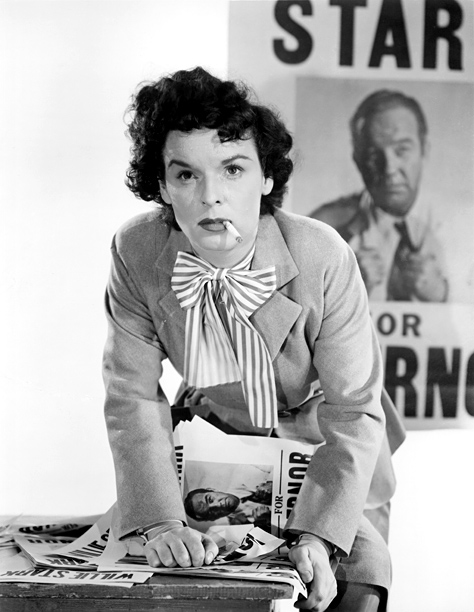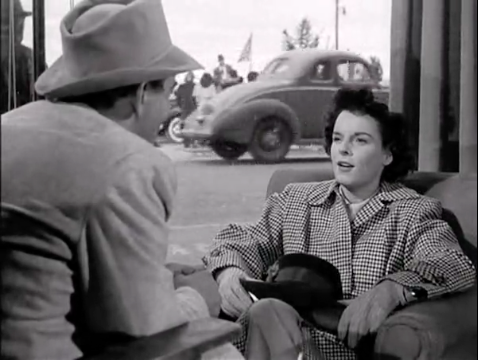Manuel here kicking off our centennial celebration of under appreciated (and under discussed!) Oscar winning actress Mercedes McCambridge.

We begin with her film debut which also happens to be her Oscar-winning vehicle, All The King's Men. She'd been doing radio work consistently for over a decade but this was as big a break as they got. The film is a political parable about that most rare of characters, the honest politician (Broderick Crawford as Willie Stark), who succumbs to corruption on his way to the top only to be punished by his deeds. It's Shakespearean in essence and all the more powerful for being based on a real-life politician, Louisiana governor, Huey Long (the inspiration behind Robert Penn Warren novel of the same name).
It's a testosterone-fueled film with only two gals...
the young and beautiful socialite Anne Stanton (Joanne Dru), the daughter of former Governor Stanton who ends up romantically entangled with Stark; and the cunning and ambitious Sadie Burke (McCambridge) who pines away for Stark while dutifully managing his campaign. Crawford, it must be said, is quite charming but in 2016 one cannot help but bristle at the way the plot coerces both beautiful actresses into being smitten by his heavyset Stark, who's first a bumbling honest fool and later a ruthless kingpin. Neither woman seems particularly taken by his money or his power—even an early scene with his wife has her unable to explain why she loves him so—making their blind devotion to him all the more baffling.
“Find a dummy? That’s what we got!”
McCambridge’s role is the type that, pardon the cliché, jolts the film alive. That first line reading, sardonically aimed at her fellow campaign managers who are hoping to rope some “dummy” into running for Governor opposite their candidate to split the hick vote, cuts right through the amiable tone the film had been sustaining til then. It establishes her no-nonsense attitude which drives much of the sardonic humor of the film. I love her first interaction with John Ireland’s Jack Burden, the journalist who’d first reported on Stark as an honest man, who’s curious as to why Sadie is on the Stark campaign trail.

Now tell, what are you on this merry-go-round for?
I take notes?
For who?
For those whom pay me.
Which is?
People.
Smart people?
Yeah. Anybody who pays me is smart.
The camera stays with her and catches every moment of her deliciously inscrutable line readings. She’s coy but amusing, knowing but not condescending. It’d be the type of witty repartee you’d easily find in a screwball comedy except, of course, we’re in a noir so the subtext of the playful interrogation is a lot more sinister than this transcript suggests. It’s no surprise that her inadvertent machinations end up making Stark the charming populist politician he always hoped he could be. For the rest of the film she’s always at Stark’s side, often in the middle of the frame merely observing—it reminded me, at times, of Winslet’s Joanna Hoffman in Steve Jobs, in the way she functions as a work-wife to Stark, though, of course, the film pushes her to want to become Stark’s real wife.
In the other scene worth highlighting here as we celebrate McCambridge, we see Sadie in Jack’s room picking up a picture of Anne in front of a mirror as she talks to herself about what the Stanton girl has that she doesn’t. It’s a curious scene for the way it requires the actress to basically tear herself down, commenting on her rough skin, rubbing her own face as she does so. It’s heartbreaking to watch but there’s a cunning quality to her performance, for Sadie isn’t merely being self-deprecating, she’s also setting up the piercing punchline to her story: “I can see what Willie sees in her,” delivered with venom and pathos. She knows Jack, Anne’s old flame, has no idea about Stark and Anne, and this performance is ultimately a way to get him to understand what’s going on. It’s a fine line McCambridge plays between wanting to warn Jack away from Anne (and Stark) while also vocalizing what’s surely been on her mind about her own inadequacies. But nothing beats the final moments of the scene: after Jack slaps her, wanting to shut her up, she laughs. Not a roaring laugh. A pitying, mumble of a laugh that’s all the more punishing for it.
After that the film drifts away from her but that laughter stays with you, mocking you, taunting you, becoming the very laugh track of this outsized political noir, as if she’s already seen what’s ahead and, keeping herself from crying, she’ll laugh it off instead. And all in her very first film role!